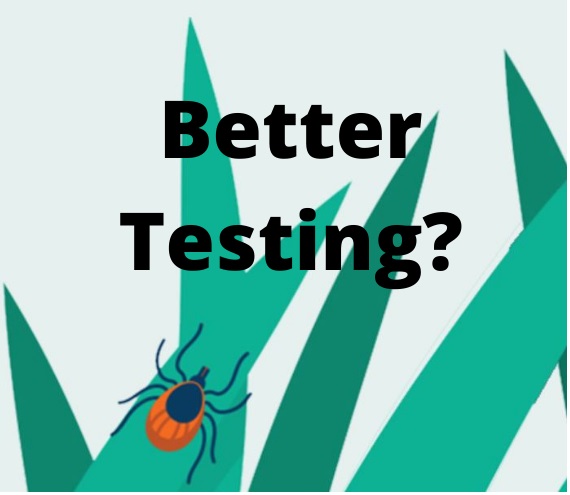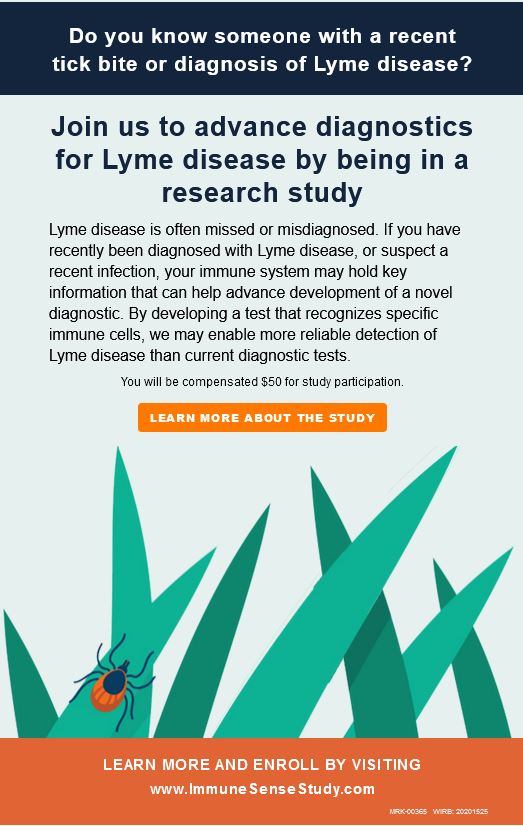Know someone with a recent tick bite, or a new case of Lyme disease?

As part of our mission to accelerate research in Lyme disease, we are providing you with this information from Adaptive Biotechnologies about its clinical study to advance diagnostics for Lyme disease. Learn more and enroll by visiting www.ImmuneSenseStudy.com.
Adaptive Biotechnologies Corp. has announced the launch of ImmuneSense Lyme™, a research study to inform the development of an improved test to detect Lyme disease in the early stages of an infection, when the disease is most treatable but often missed or misdiagnosed.
The study calls for approximately 1,000 participants in the Northeast, mid-Atlantic and upper Midwest, where 96% of Lyme cases occur. Participants can be evaluated at a local study site in their area or soon via telehealth in the comfort and safety of their own homes.
“Lyme disease can be impossible to treat, particularly if it is not diagnosed early, and the symptoms of late stage Lyme disease can be so severe that it causes people to lose their jobs and have trouble caring for their families,” said Linda Giampa, executive director, Bay Area Lyme Foundation.
“We are always interested in research that uncovers new information that may help understand how our bodies mount an immune response to this horrible disease.”
Complex to diagnose
Lyme disease can be especially complex to diagnose in the absence of more accurate testing because 77 percent of patients experience symptoms that overlap with many autoimmune and neurological diseases, as well as other tick-borne diseases. Current serology tests, the standard in Lyme disease diagnosis, detect antibodies made by the body in response to an infection.
These antibodies can take several weeks to develop, resulting in a high false negative rate of 60–70 percent in people who are tested early after a tick bite but have not yet developed antibodies. Additionally, current tests cannot tell the difference between an active infection and one that has resolved, so many people will test positive using serology for Lyme disease long after successful treatment.
“The immune system of someone who recently contracted Lyme disease may be able to tell us important information that current tests cannot. Using artificial intelligence and machine learning, we are looking at how our bodies naturally detect and respond to Lyme disease, which is an entirely new approach to diagnosis,” said Lance Baldo, Chief Medical Officer of Adaptive Biotechnologies.
“Our goal with this new study is to accelerate the development of a diagnostic focused on early detection of Lyme disease so people can be diagnosed and treated sooner, when treatment has a better chance of being most effective.”
In the ImmuneSense Lyme Study, Adaptive will apply its immune medicine platform to measure the presence of specialized cells in the immune system, called T cells, that identify the disease early on and multiply to combat the infection. Measuring this response may allow for accurate detection after a tick bite or the first sign of symptoms, and in later weeks when the disease has been treated but symptoms persist. This is the same approach that Adaptive is using with Microsoft to map and measure the immune response of T cells to many diseases, including COVID-19 through its ImmuneRACE virtual clinical study.
How to Join ImmuneSense Lyme
The study is seeking participants who may have signs and symptoms of Lyme disease or were recently diagnosed with Lyme disease and have not taken antibiotics for more than three days. Signs and symptoms of Lyme disease can be assessed at a study site or soon via telehealth.
Study sites are enrolling in Connecticut, Maine, Maryland, Massachusetts, Minnesota, New Hampshire, New Jersey, New York, Pennsylvania, Rhode Island, Virginia, and Wisconsin. Eligible participants can learn more about a study site in their area and register at www.ImmuneSenseLyme.com.
About Lyme Disease
Lyme disease is a bacterial infection that is transmitted to humans via infected ticks. A bull’s-eye rash is one of the hallmarks of the disease, but other symptoms can be non-specific and even overlap with symptoms of COVID-19. These include body aches, fever, breathlessness, eye pain, diarrhea, chest tightness, headache, fatigue or joint pain. If left untreated, Lyme disease can become a serious illness for many people, but if caught early, it can typically be treated with antibiotics and long-term complications can be avoided. Based on data reported by the Centers for Disease Control and Prevention, there are an estimated 427,000 new cases of Lyme disease in the United States every year.
About Adaptive Biotechnologies
Adaptive Biotechnologies is a commercial-stage biotechnology company focused on harnessing the inherent biology of the adaptive immune system to transform the diagnosis and treatment of disease. We believe the adaptive immune system is nature’s most finely tuned diagnostic and therapeutic for most diseases, but the inability to decode it has prevented the medical community from fully leveraging its capabilities. Our proprietary immune medicine platform reveals and translates the massive genetics of the adaptive immune system with scale, precision and speed to develop products in life sciences research, clinical diagnostics, and drug discovery. We have two commercial products, and a robust clinical pipeline to diagnose, monitor and enable the treatment of diseases such as cancer, autoimmune conditions and infectious diseases. Our goal is to develop and commercialize immune-driven clinical products tailored to each individual patient. For more information, please visit adaptivebiotech.com and follow us on www.twitter.com/adaptivebiotech.
SOURCE OF PRESS RELEASE: Adaptive Biotechnologies





















We invite you to comment on our Facebook page.
Visit LymeDisease.org Facebook Page